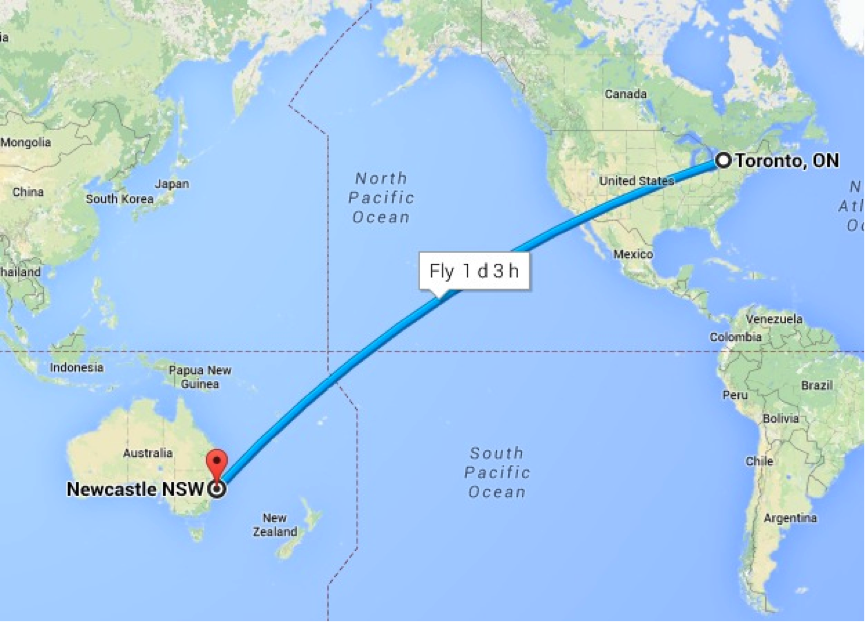I will be working in the UK from February 19 to February 28, 2026. I…
Travelling
In case you are wondering why there is no update to my blog today – the answer is that I am travelling all day.
I have been travelling to Canada today and blogs for the next week might appear at strange times – given the time difference and my other commitments.
In the next 24 hours or so I will have limited capacity to respond to E-mails and moderate any comments. I moderate all comments which contain links so if it is sitting in the queue for some time you will understand why.
I have been invited as one of the speakers at the New Economic Thinking’s – 2014 Annual Plenary Conference – in Toronto, Canada from Thursday, April 10, to Saturday, April 12, 2014.
iNET will stream the conference live if you want to catch up with the sessions.
The Program – is not yet up but I am on a session entitled – Integration, Currency Unions and Balance Payments – which will be held on Friday, April 11th from 13:00 – 14:45.
The session description is:
Asymmetrical monetary unions, wherever and whenever attempted in the absence of corresponding political institution building, have ended up in tears and retribution. The Gold Standard, the various pegs between domestic currencies and the U.S. dollar (S.E. Asia, Argentina, Mexico etc.), the European Exchange Rate Mechanism, the Eurozone that followed the latter’s collapse, all resembled historical invasions of Russia – that is, a brisk beginning full of enthusiasm and hope, rapid progress that seemed unstoppable, followed by a heart wrenching slowdown as cruel winter took its toll, and ending up with blood on the snow and infinite retributions thereafter. Is the European Monetary Union invariably going to head down this course?
The other speakers are:
- Martin Wolf – Financial Times
- Peter Temin – MIT
- Moderator – Amanda Lang – senior business correspondent for CBC News
Euro Book
Several people have asked me when my blog will return to its normal coverage. I have lost about 2/3rds of my daily traffic since I have been occupied almost solely writing the Euro book. The answer is that I have three chapters left to write (out of 16) and an introduction and then a thorough edit.
I am hoping to deliver the complete manuscript to the publisher in three weeks. So by the end of April we will be back to normal coverage.
I had to be single-minded since the start of the year because I have a number of projects on the go each week and I had such a tight deadline with the book. So something had to give and it was the regular blog updates.
I am also surprised the material hasn’t been of interest to many people but then maybe I have strange tastes. I have enjoyed immensely delving into all this material and restoring my foreign language skills, which wane without practice. It seems to me that it is essential to really understand all the history to see the way forward.

Dear Bill,
You may have lost some drive-by traffic, but I’m sure many of your regular readers find the new material just as interesting as the regular fare.
It’s vitally important that the history is documented, because no doubt in the future somebody will try and repeat the whole sorry episode.
Currency unions in Europe appear to be like zombies. They just keep coming back no matter how many time they die.
Bienvenu a Canada, Bill! Hope you’ll stay a while and sort out our country!
Below my letter on JG published recently in the National Post:
Re: It’s the interns who lose in crackdown on unpaid internships, Andrew Coyne, April 2, 2014
In the 1970s, the Local Initiatives Program created jobs and community benefits which were funded by the federal government and delivered through local non-profit organizations and citizen groups. Projects covered such areas as arts and culture, recreation, tourism, research and the environment. If reintroduced today, internships could be part of this initiative.
Society benefits because young people need work experience while those who have lost jobs must find new ones before skills are lost. Long-term unemployment can also lead to pathologies such as sickness, substance abuse, and mental health issues.
In addition, a job guarantee program (JG) with a minimum livable wage would provide the economy with counter-cyclical stability. When times are bad, JG hiring would pick up. But when times improve, the private sector would bid employees out of the program.
British economist John Maynard Keynes maintained that no law of nature requires us to keep large swaths of our workforce unemployed and that those who believe otherwise have minds “fuddled with nonsense”.
Welcome to Canada!
I’ll be buying the book 🙂
Bill, I don’t think your readers aren’t interested. It may be that they feel they can’t contribute much to your historical discussion. But this history is necessary. Be sure to let us know when the book is out.
I’m one of those 2/3rds, and have been holding off reading the drafts because I’d rather wait for the finished book. I check in every once in a while to see if you’re back to the normal blog. Once that resumes, your traffic will probably be back to normal, if my reasons for staying away are common.
Bill, Just came across Ann Pettifor tweeting your appearance at INET conference. Flattering comments from Ann and good to hear you are getting a hearing outside MMT circles.
Link on iNET session on YouTube:
http://www.youtube.com/watch?v=Yjq1-OtJxAg
Bill,
I thought that the video on YouTube was an exact copy of the live version on iNET. Now i notice it isn’t, the slides are not visible. Here is also some kind of direct link to the live version (with slides) on iNET.
http://new.livestream.com/INETeconomics/HumanAfterAll/videos/47750785
Go direct to 23.50 min. for the beginning. Click right above for full screen. Your start is at 36.45 min.